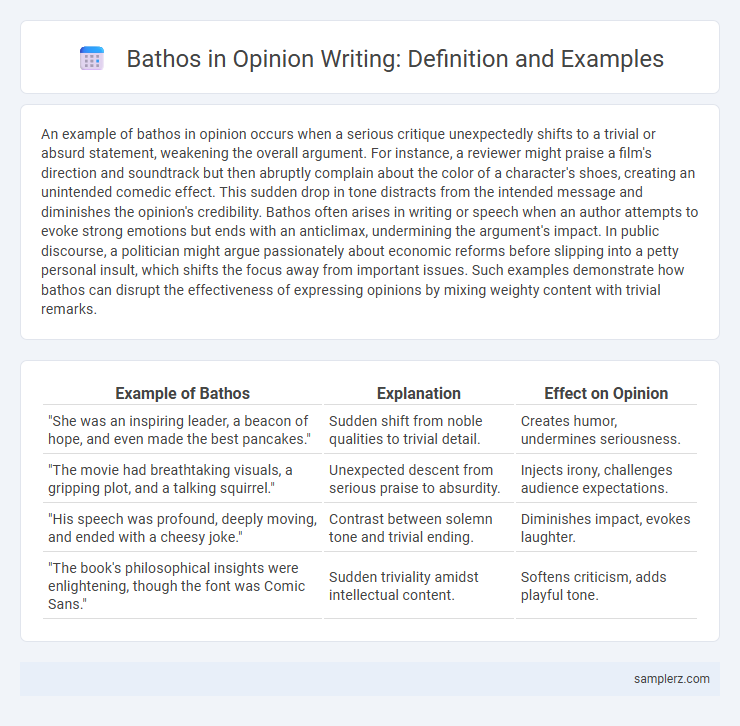An example of bathos in opinion occurs when a serious critique unexpectedly shifts to a trivial or absurd statement, weakening the overall argument. For instance, a reviewer might praise a film's direction and soundtrack but then abruptly complain about the color of a character's shoes, creating an unintended comedic effect. This sudden drop in tone distracts from the intended message and diminishes the opinion's credibility. Bathos often arises in writing or speech when an author attempts to evoke strong emotions but ends with an anticlimax, undermining the argument's impact. In public discourse, a politician might argue passionately about economic reforms before slipping into a petty personal insult, which shifts the focus away from important issues. Such examples demonstrate how bathos can disrupt the effectiveness of expressing opinions by mixing weighty content with trivial remarks.
Table of Comparison
| Example of Bathos | Explanation | Effect on Opinion |
|---|---|---|
| "She was an inspiring leader, a beacon of hope, and even made the best pancakes." | Sudden shift from noble qualities to trivial detail. | Creates humor, undermines seriousness. |
| "The movie had breathtaking visuals, a gripping plot, and a talking squirrel." | Unexpected descent from serious praise to absurdity. | Injects irony, challenges audience expectations. |
| "His speech was profound, deeply moving, and ended with a cheesy joke." | Contrast between solemn tone and trivial ending. | Diminishes impact, evokes laughter. |
| "The book's philosophical insights were enlightening, though the font was Comic Sans." | Sudden triviality amidst intellectual content. | Softens criticism, adds playful tone. |
Defining Bathos: Understanding Emotional Drop in Opinion Pieces
Bathos occurs in opinion pieces when a writer shifts abruptly from a serious or elevated tone to something trivial or absurd, weakening the emotional impact and credibility of the argument. This sudden emotional drop can confuse readers, making earnest points seem unintentionally humorous or insincere. Recognizing bathos aids writers in maintaining consistent tone and effectively conveying their message without undermining their intended emotional appeal.
Classic Examples of Bathos in Editorial Columns
Classic examples of bathos in editorial columns often emerge when writers abruptly shift from serious political critique to trivial or overly sentimental commentary, undermining their arguments. One notable instance is when a column about economic policy suddenly descends into melodramatic anecdotes unrelated to key issues, diluting the impact of the editorial. Such lapses highlight the delicate balance required in opinion writing to maintain credibility and engage readers effectively.
How Bathos Weakens Persuasive Arguments
Bathos undermines persuasive arguments by introducing sudden shifts from serious to trivial tones, which can cause the audience to question the speaker's credibility and message sincerity. When a speaker's emotional appeal collapses into unintended humor or absurdity, it distracts from the core argument and diminishes its impact. This erosion of trust reduces the overall effectiveness of persuasion, making it harder to convince the audience of critical points.
Notorious Bathos Moments in Political Opinions
Notorious bathos moments in political opinions often emerge when serious policy debates abruptly shift to trivial or overly sentimental remarks, undermining the gravitas of the discourse. An infamous example is when seasoned politicians conclude complex economic discussions with cliched slogans or emotional appeals that contrast starkly with the preceding argument. These sudden tonal shifts can diminish the perceived credibility of political figures and erode public trust in meaningful dialogue.
Satirical Opinions: When Bathos Enhances Humor
Satirical opinions often employ bathos to create abrupt shifts from serious critique to exaggerated triviality, enhancing humor by highlighting absurdities. For instance, a political commentary might begin with grave analysis of corruption but descend into hyperbolic complaints about minor inconveniences, amplifying the satirical effect. This deliberate use of bathos sharpens the contrast, engaging readers through unexpected comedic relief while reinforcing the underlying message.
Critiquing Public Figures: Bathos Gone Wrong
Public figures often fall into bathos when their serious criticisms unexpectedly shift into trivial or overly sentimental remarks, undermining their credibility. For example, a politician condemning governmental corruption with a heartfelt yet exaggerated anecdote about a lost pet distracts from the core issue, resulting in diminished audience trust. This misuse of emotional appeal in critiques can weaken public discourse and blur the boundaries between genuine concern and melodrama.
Reader Reactions to Bathos in Opinion Essays
Reader reactions to bathos in opinion essays often include confusion or disappointment due to abrupt shifts from serious analysis to trivial or exaggerated claims. This unexpected tonal shift can undermine the author's credibility and dilute the persuasive impact of the essay. Effective use of bathos requires careful balance to avoid alienating readers while maintaining engagement.
Bathos vs. Pathos: Emotional Impact in Opinion Writing
Bathos in opinion writing occurs when an author shifts abruptly from a serious or emotional tone to something trivial or ridiculous, undermining the intended emotional impact. This contrast can weaken the persuasive power, as opposed to pathos, which carefully cultivates genuine emotional appeal to engage readers and strengthen arguments. Understanding the difference between bathos and pathos is essential for writers aiming to maintain credibility and effectively influence their audience through emotional resonance.
Avoiding Accidental Bathos in Thought Leadership
Avoiding accidental bathos in thought leadership requires maintaining a consistent tone that aligns with the intended message's gravitas, such as in professional articles by industry experts like Simon Sinek or Brene Brown. A sudden shift from profound insights to overly simplistic or trivial statements can undermine credibility and dilute the impact of key ideas. Thought leaders should carefully review content to ensure emotional resonance without slipping into unintended humor or sentimentality.
Lessons from Famous Bathos Fails in Op-eds
Famous bathos fails in op-eds reveal how shifting abruptly from serious analysis to trivial details undermines credibility and reader engagement. For example, a columnist dissecting economic policies but ending with an unrelated anecdote about their pet's quirky behavior disrupts the article's tone and weakens its argument. These missteps highlight the importance of maintaining consistency and relevance to preserve persuasive impact in opinion writing.

example of bathos in opinion Infographic
 samplerz.com
samplerz.com